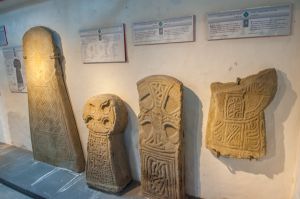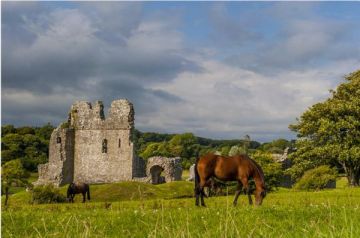
The cross head has a carving of the Virgin Mary with St John flanking knotwork ornamentation, and the stone is set on a base decorated with a hunting scene. The Conbelin Cross originally stood outside Margam churchyard. The stone is inscribed in memory of the donor with the words, ‘CONBELIN P[O]SUIT HANC CRUCM P[RO] [A]NIMA RI[C?]’ – ‘Conbelin erected this cross for the soul of Ric...’.
Among the other stones that caught my eye were ...
The Bodvoc Stone
A late 6th or early 7th-century Christian memorial stone with a Latin inscription running vertically. This once stood on Margam Mountain set into a prehistoric barrow - one of four barrows in a linear arrangement. This simple stone is the oldest known example of a family history, or lineage, in Wales. The four lines of script detail four generations of the same family.
The four lines read BODVOCI HIC IACIT, FILIUS CATOTIGIRNI. PRONEPUS ETERNALI, VEDOMAVI, which translates as 'The stone of Bodvoc. Here he lies, son of Cattegern, great-grandson of Eternalis Vedomavus'. The name Cattegern means 'lord of battle', suggesting that the family were local chiefs, or war leaders.

Cross of Grutne
This 10th-century disc-headed cross once stood in Margam churchyard, though it probably was brought here from elsewhere. The base of the cross has 10 lines of Latin inscription that translates as 'In the name of God the most high, this cross of Christ was erected by Grutne for the soul of Ahest'.
Cantusus memorial
A fascinating 6th-century memorial that began as a Roman milestone. There was a major Roman road between Caerleon and Carmarthen, and in the 6th century one of the mile markers along this route was reused for the tombstone of a local leader; Cantusus, son of Paulinus. It was discovered in 1839 just east of Port Talbot.
A section of the stone has been lost, but drawings made at the time it was discovered let us know what the original stone looked like. On one side is a Latin inscription to Emperor Maximus Daia (309-313), and on the other is Latin text which reads 'Here lies Cantusus, his father was Paulinus'.
There are also several medieval grave slabs of abbots of Margam, and the effigy of a 14th-century knight. The stones are housed in one of the first purpose-built church school buildings in Wales, and the museum stands in the grounds of Margam Abbey, a 12th-century Cistercian monastery.
Seasonal opening - please check the Cadw website for current details.

cross slab



CONBELIN CROSS



MORE STONE IMAGES




 We've 'tagged' this attraction information to help you find related historic attractions and learn more about major time periods mentioned.
We've 'tagged' this attraction information to help you find related historic attractions and learn more about major time periods mentioned.


